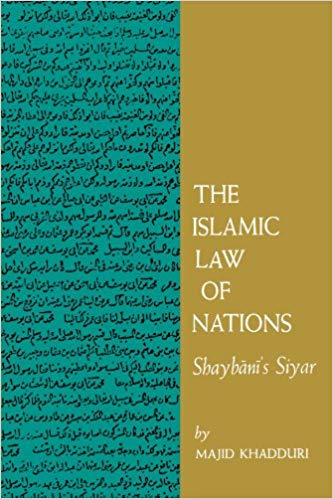
Today, in my Islamic philosophy class, we’re going to begin the discussion of the last text that we’re reading for the course, which is Majid Khadduri’s The Islamic Law of Nations: Shaybani’s Siyar (2002). It’s a bit of a departure from philosophy as such, but, given the interests of the students in this particular small class, I thought it worth a look.
Abu ‘Abd Allah Muḥammad b. al-Ḥasan b. Farqad al-Shaybānī (محمد بن الحسن الشيباني), who lived in Iraq between roughly AD 749 and AD 805, is sometimes called “the father of Islamic international law.”
He’s also interesting because of his association with the principal founders of three of the four “orthodox” Sunni madhahib or legal schools — meaning “schools of thought,” not “law schools” in the sense that Harvard and Stanford and BYU have law schools. In Kufa, he was a student of Abu Hanifa, the founder of what soon came to be known as the Hanafi school of jurisprudence (fiqh). But only for about two years, because Abu Hanifa died in AD 767, when al-Shaybani was just eighteen. Thereafter, he studied with Abu Hanifa’s foremost disciple, and it’s fair to say that al-Shaybani should be considered a Hanafi legal thinker.
But he also studied for perhaps two or three years with Malik b. Anas, the founder of the Maliki school of jurisprudence. And, much later in his life, he was the teacher of Muhammad b. Idris al-Shafi‘i, the founder of the Shafi‘i madhhab. Although al-Shafi’ī ultimately parted ways with al-Shaybani and even wrote a book criticizing him — the Kitāb al-Radd ʿalā Muḥammad b. al-Ḥasan (“Book of the Answer to Muḥammad b. al-Ḥasan” or “Refutation of Muḥammad b. al-Ḥasan”) — al-Shafi’ī continued to admire al-Shaybani and to hold him in affection.
Thus, the only one of the four eponymous founders of the Sunni madhahib with whom al-Shaybani had no significant personal interaction was his younger contemporary, Aḥmad ibn Ḥanbal, the founder of the Hanbali school of jurisprudence.
Moreover, al-Shaybani also studied with other famous jurists, such as Sufyan al-Thawrī (whose short-lived “Thawrī” madhhab or school of law barely outlived its founder) and al-Awzāʿī (who likewise founded his own madhhab, which lasted in Syria and Andalusia until the tenth century).
For the better part of a decade, by appointment of the great Abbasid caliph Harun al-Rashid, al-Shaybani served as qadi or chief judge of Raqqa, which Harun had taken as his capital in lieu of Baghdad. This is the same Raqqa that, for a while, recently served as the seat of the so-called “caliphate” of Abu Bakr Al-Baghdadi, the leader of ISIS.
It is said that al-Shaybani died on the same day as his near neighbor al-Kisā’i, one of the greatest of classical Arabic grammarians and philologists and the compiler of one of the best of the fascinating collections of Qiṣaṣ al-‘Anbiyā’ (قصص الأنبياء) or “Stories of the Prophets” that were very popular at the time and that preserve many otherwise lost stories and legends about biblical and other prophetic figures. The Caliph is reported to have lamented that, with their deaths, he had “buried law and grammar alongside each other.”
Here’s the jacket note for the book that we’re reading and discussing:
From its origins Islam has been an expansionist religion, understanding itself as a matter of faith to be in a permanent state of war with the non-Muslim world. After the initial consolidation of the Islamic caliphate, however, it soon became apparent that constant military hostilities could not be sustained and that other forms of relationship with non-Muslim nations would be necessary. To reconcile the imperatives of faith with the limits of military power, Islamic scholars developed elaborate legal doctrines. In the second century of the Muslim era (eighth century C.E.), hundreds of years before the codification of international law in Europe by Grotius and others, Muhammad ibn al-Hasan al-Shaybani, an eminent jurist of the Hanafite school in present-day Iraq, wrote the first major Islamic treatise on the law of nations, Kitab al-Siyar al-Kabir. Translated with an extensive commentary by Majid Khadduri, Shaybani’s Siyar describes in detail conditions for war (jihad) and for peace, principles for the conduct of military action and of diplomacy, and rules for the treatment of non-Muslims in Muslim lands. A foundational text of the leading school of law in Sunni Islam, it provides essential insights into relations between Islamic nations and the larger world from their earliest days up to the present.
I might quibble just a bit with the opening line of that jacket summary (though perhaps not), but, otherwise, it’s pretty well done.










